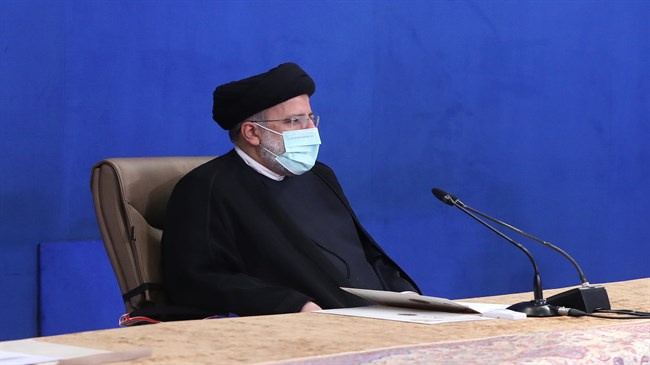President Raeisi: Smart restrictions to steadily substitute COVID closures

Iran’s President Seyyed Ebrahim Raeisi said smart restrictions must gradually replace COVID-19 closures.
In an address to a Saturday meeting of the National Task Force for Fighting the Coronavirus, the president added that under the present circumstances, to compensate for the losses suffered due to the outbreak of the COVID-19 pandemic and delays caused by the disease in the country’s development and social activities, domestic scientific and research centers are required to work out and propose effective solutions, IRNA reported.
Commenting on the increased pace of student vaccinations in the country, Raeisi called for greater coordination, as a necessity, between the Education Ministry and Health Ministry in the process of inoculating students over 12 years old.
He noted that to accelerate the student vaccinations, the Education Ministry must cooperate with the Health Ministry through providing it with schools enjoying favorable situations for administering the jabs.
On the vaccination of children below age 12, the president said that due to the scientific controversies in this regard, no move will be made to this end until uncertainties are resolved.
He warned against noncompliance with the health protocols as a very dangerous mistake in the fight against the coronavirus, saying some people wrongly believe that after receiving the vaccine, they are immune to the disease.
This comes as in view of scientific findings that health protocols must still be seriously observed by people and social groups, and in different centers, Raeisi emphasized.
The president stressed that being fully vaccinated is a prerequisite for any entry into and exit from the country.
He also urged the Health Ministry to remove ambiguities about the coronavirus in the society through swiftly providing scientific explanations lest people are worried or disappointed.
Lowest in fifth wave
Figures released by the Health Ministry on Saturday show that Iran’s daily COVID-19 deaths since the beginning of the fifth wave of the pandemic in the country in late June reached its lowest in the past 24 hours, standing at 217.
Iran was grappling with the fifth wave of the pandemic, mainly sparked by the spread of the Indian coronavirus variant, known as Delta, during late June-late September, seeing record high deaths and infections of above 700 and 40,000, respectively. The number of casualties, however, has been declining for a few days, indicating that the country is past the peak of the fifth wave’s infections and deaths, as announced by the ministry on Thursday.
The Health Ministry also announced in a statement on Saturday that daily COVID-19 infections reached 10,135 in the past 24 hours.
It said the total COVID-19 death toll and infections since the beginning of the outbreak in the country in late February 2020 stand at 120,880 and 5,611,700, respectively.
According to the ministry, 5,802 COVID-19 patients are in critical condition, and of the newly-detected cases, 1,673 individuals have been hospitalized.
It added that 5,075,482 COVID-19 patients have so far either recovered from the disease or have been discharged from hospitals.
The statement added 32,411,004 coronavirus diagnostic tests have so far been carried out in the country and 56,596,124 doses of vaccines have been administered.
The Health Ministry said 16 cities in the country are coded red (very high-risk), while 198 are in the orange zone (high-risk).
The number of the country’s yellow (medium-risk) and blue (low-risk) cities are 176 and 58, respectively, according to the ministry.
Iran’s public vaccination process has gained greater momentum over the past weeks in view of the rise in imports and domestic production of vaccines, setting new daily records.
The country has received several COVID-19 vaccine batches from Russia (Sputnik V), China (Sinopharm), Japan (AstraZeneca) and India (COVAXIN), and has also developed a number of COVID jabs domestically.
Health Minister Dr. Bahram Einollahi said on Tuesday that 70 percent of the country’s population will be vaccinated against COVID-19 in two weeks’ time.
Source: Iran Daily

